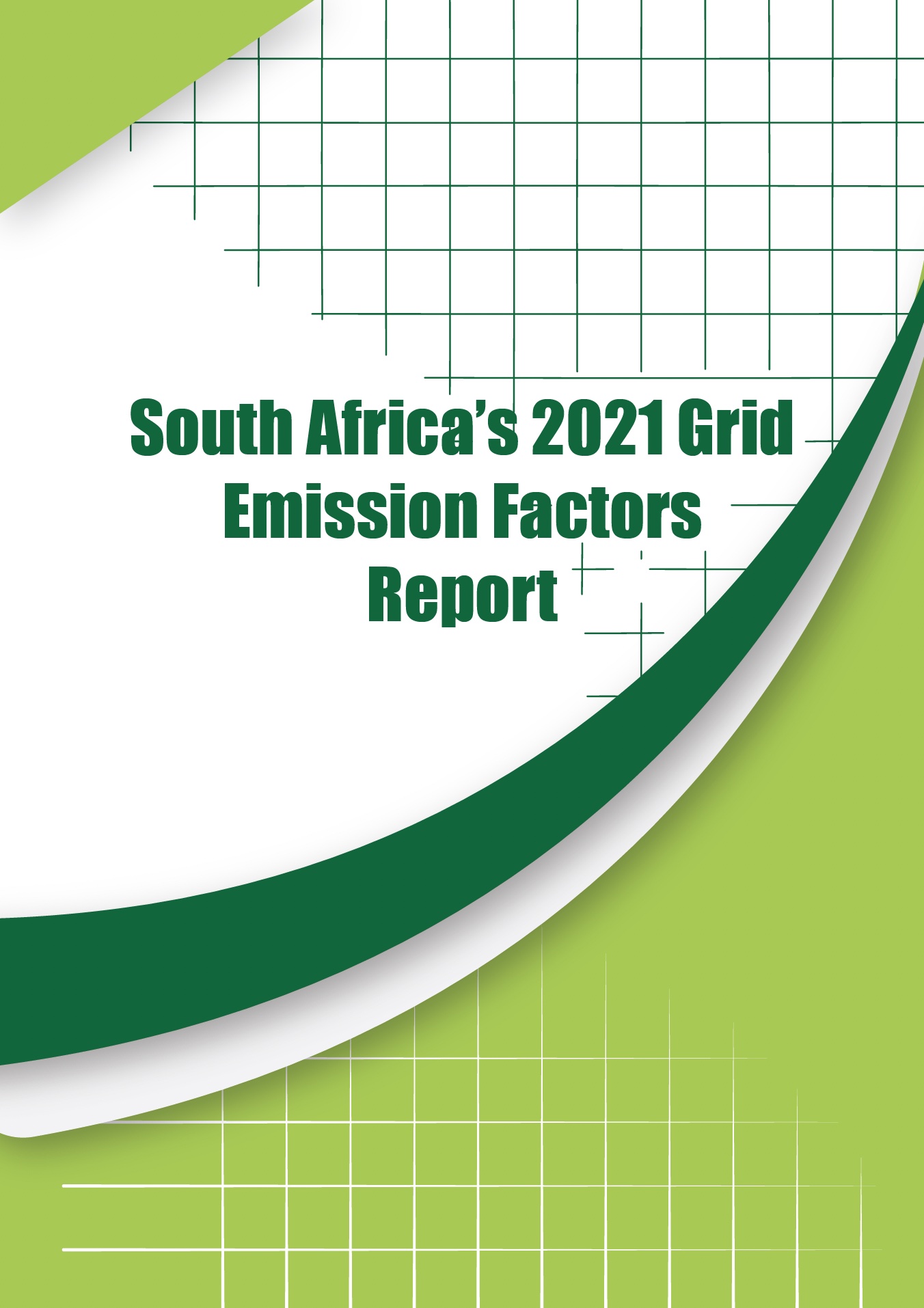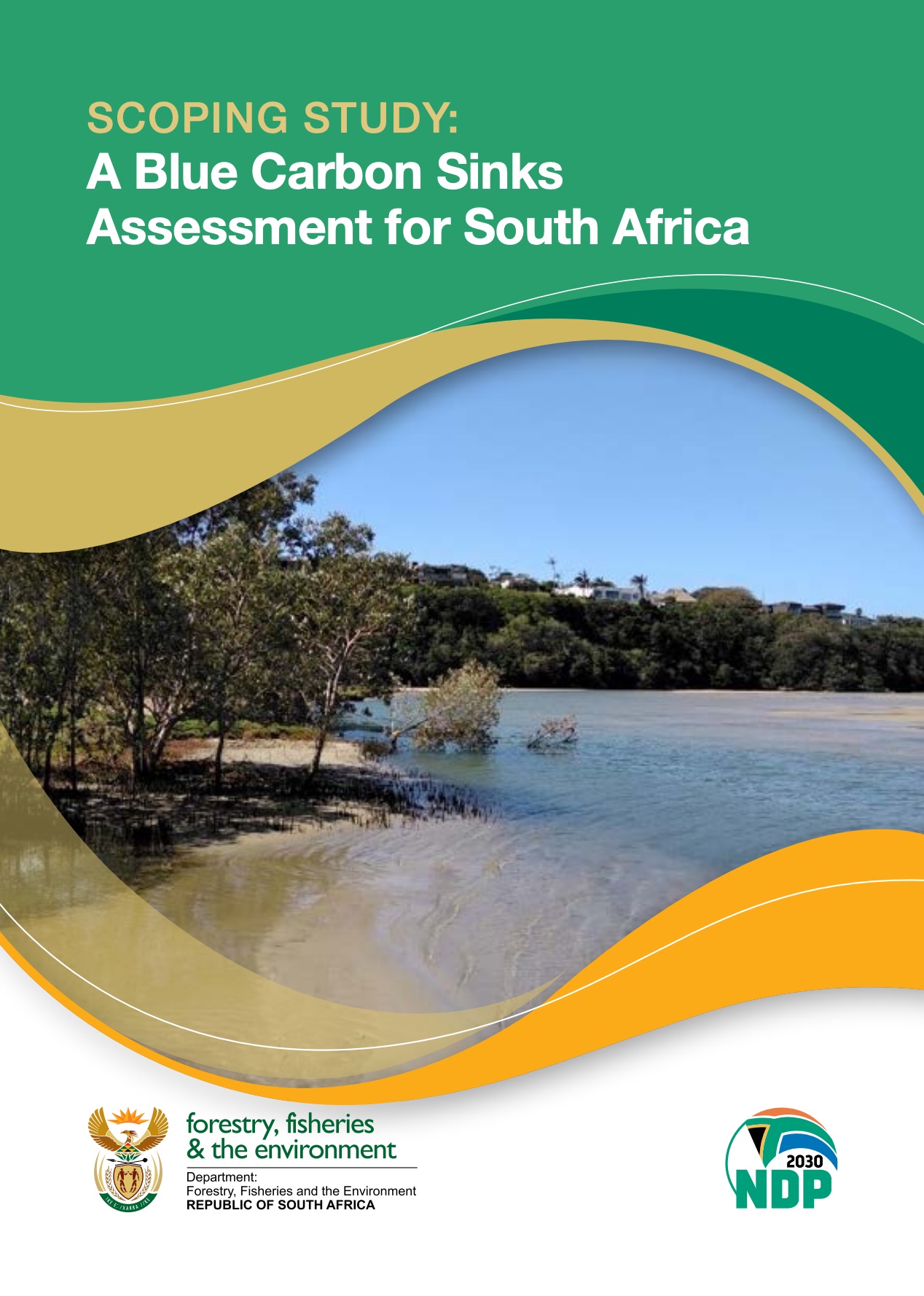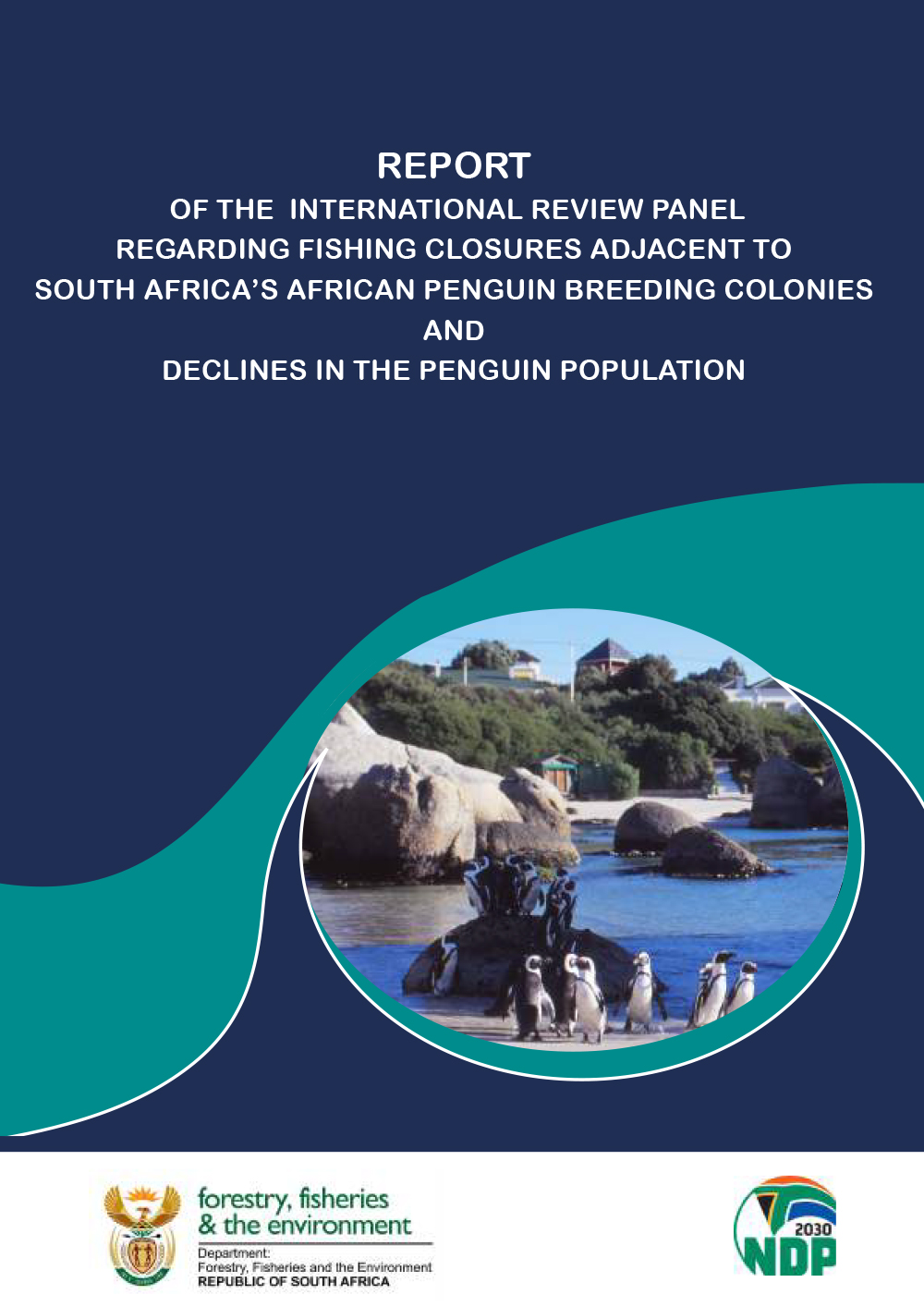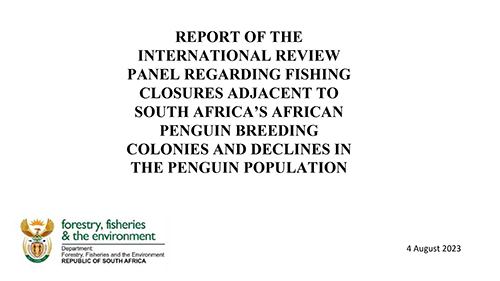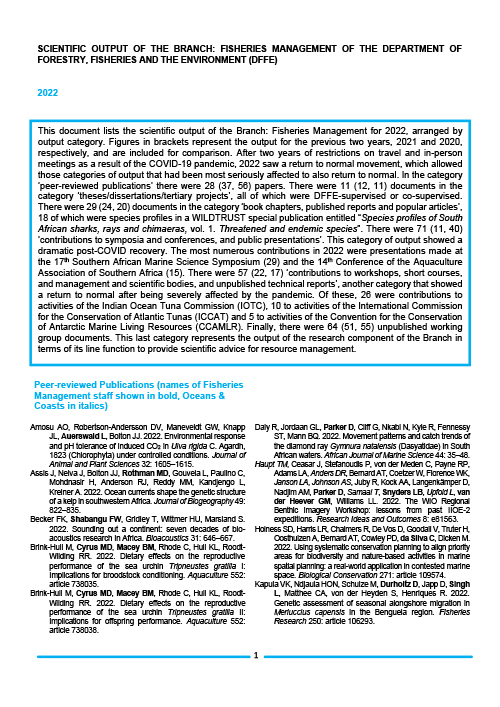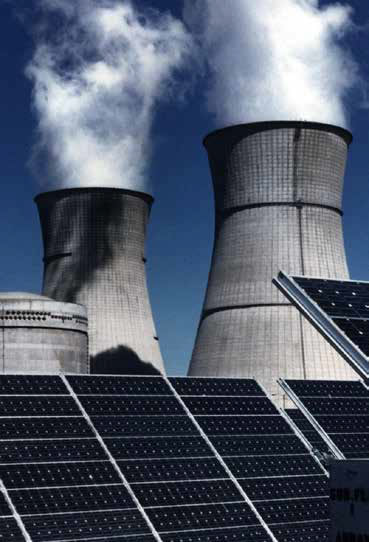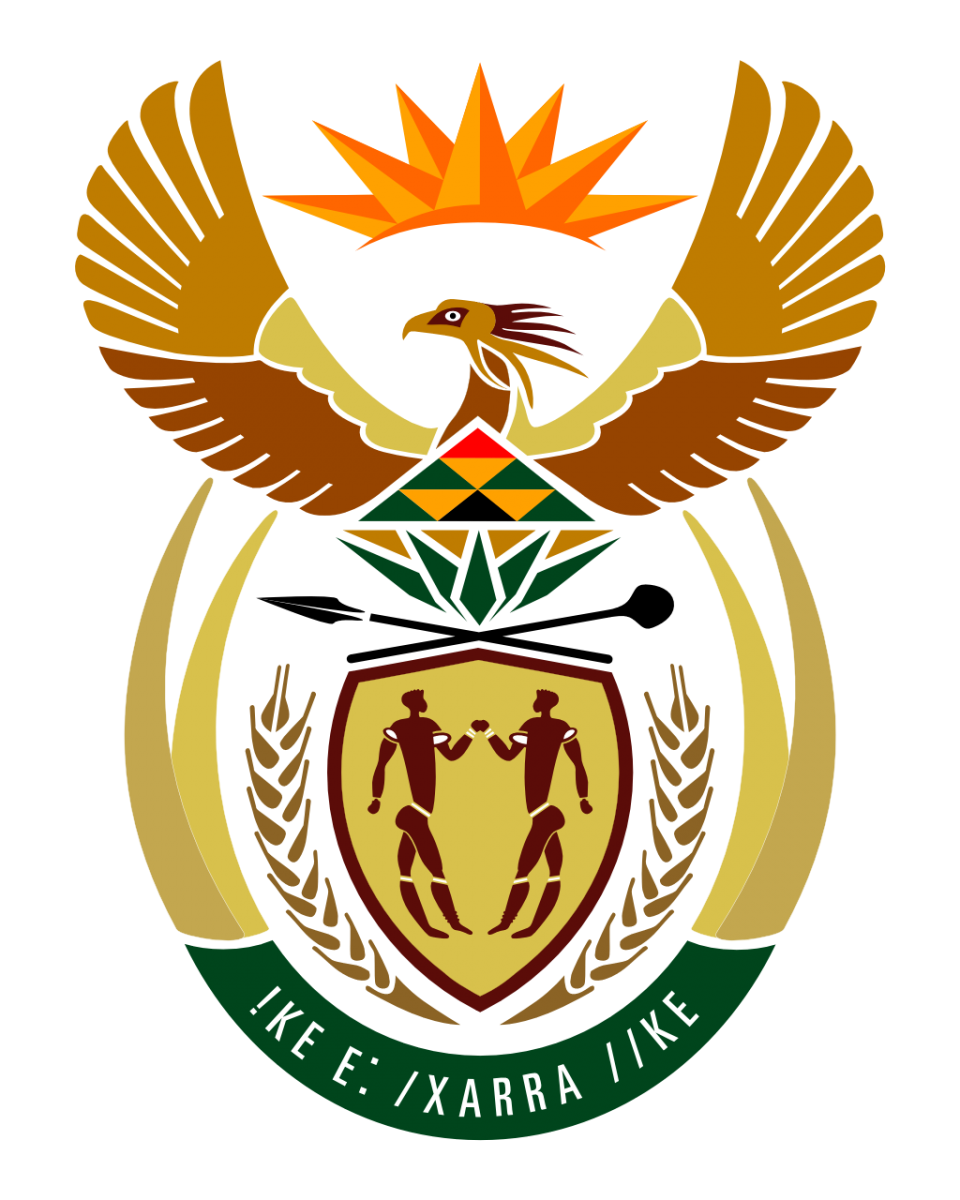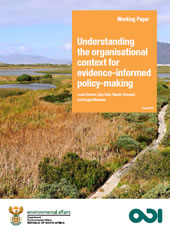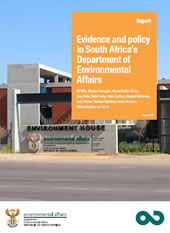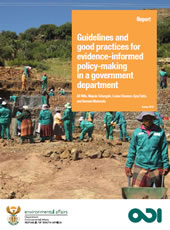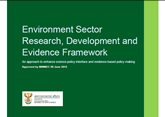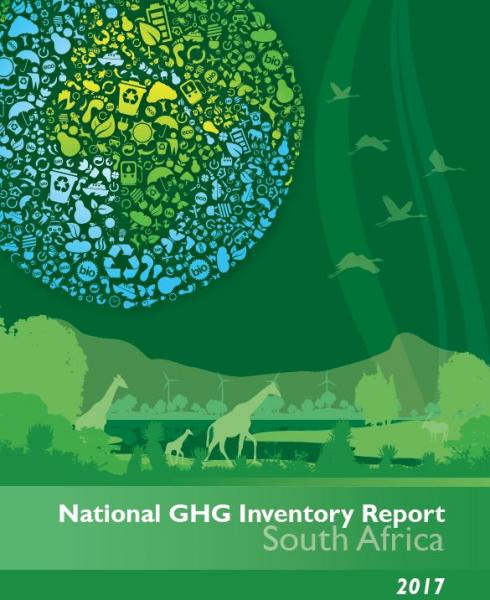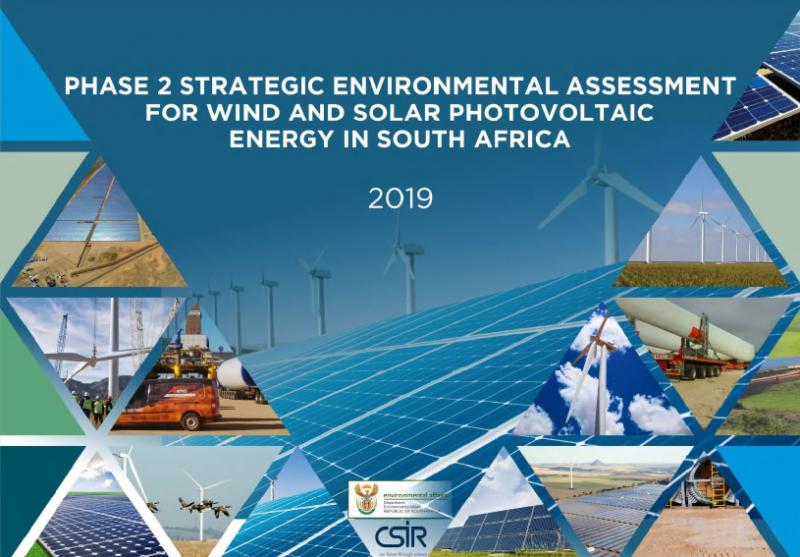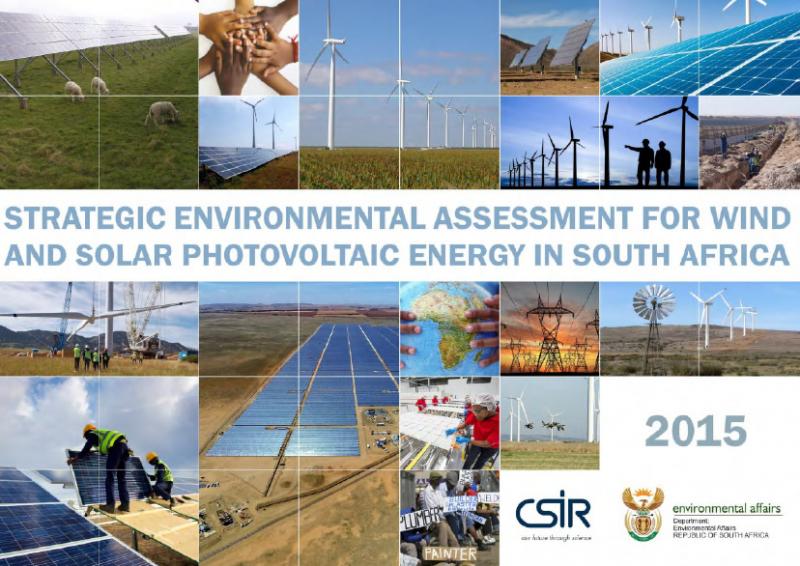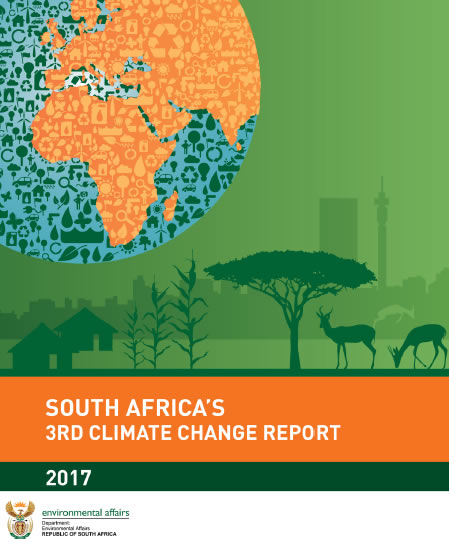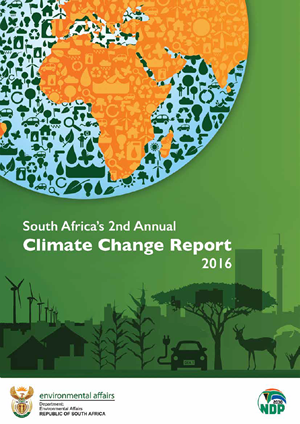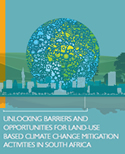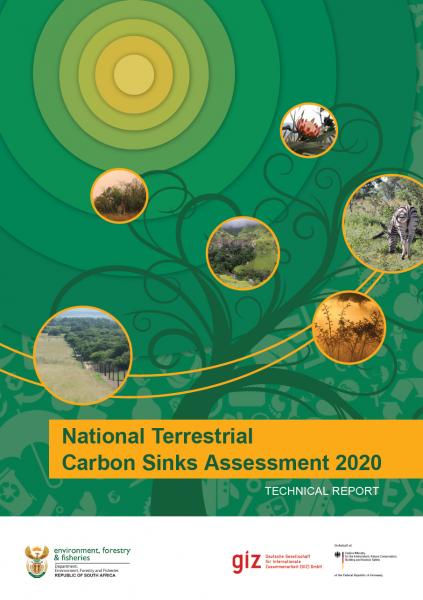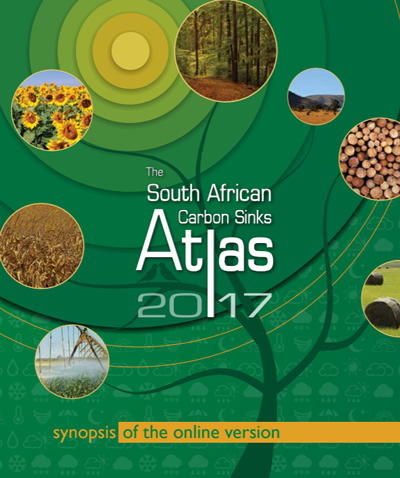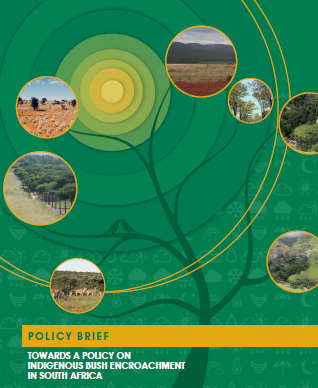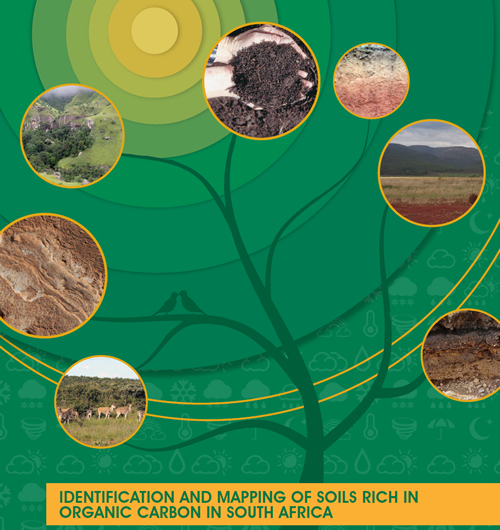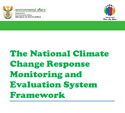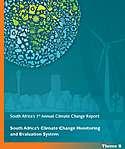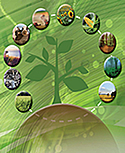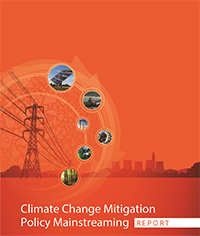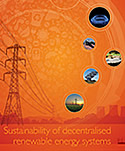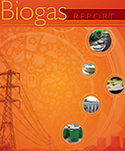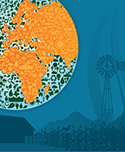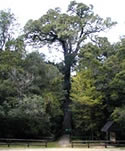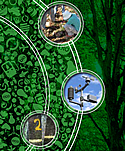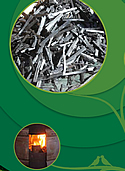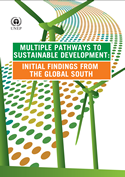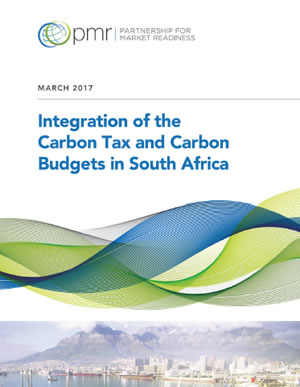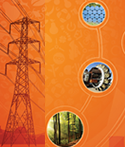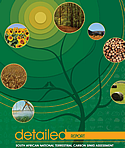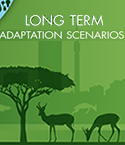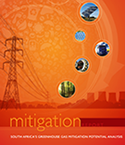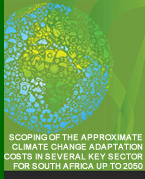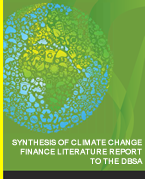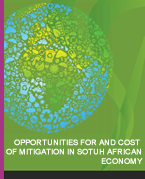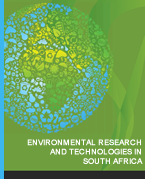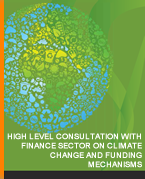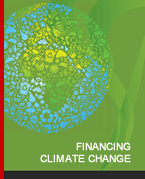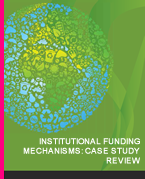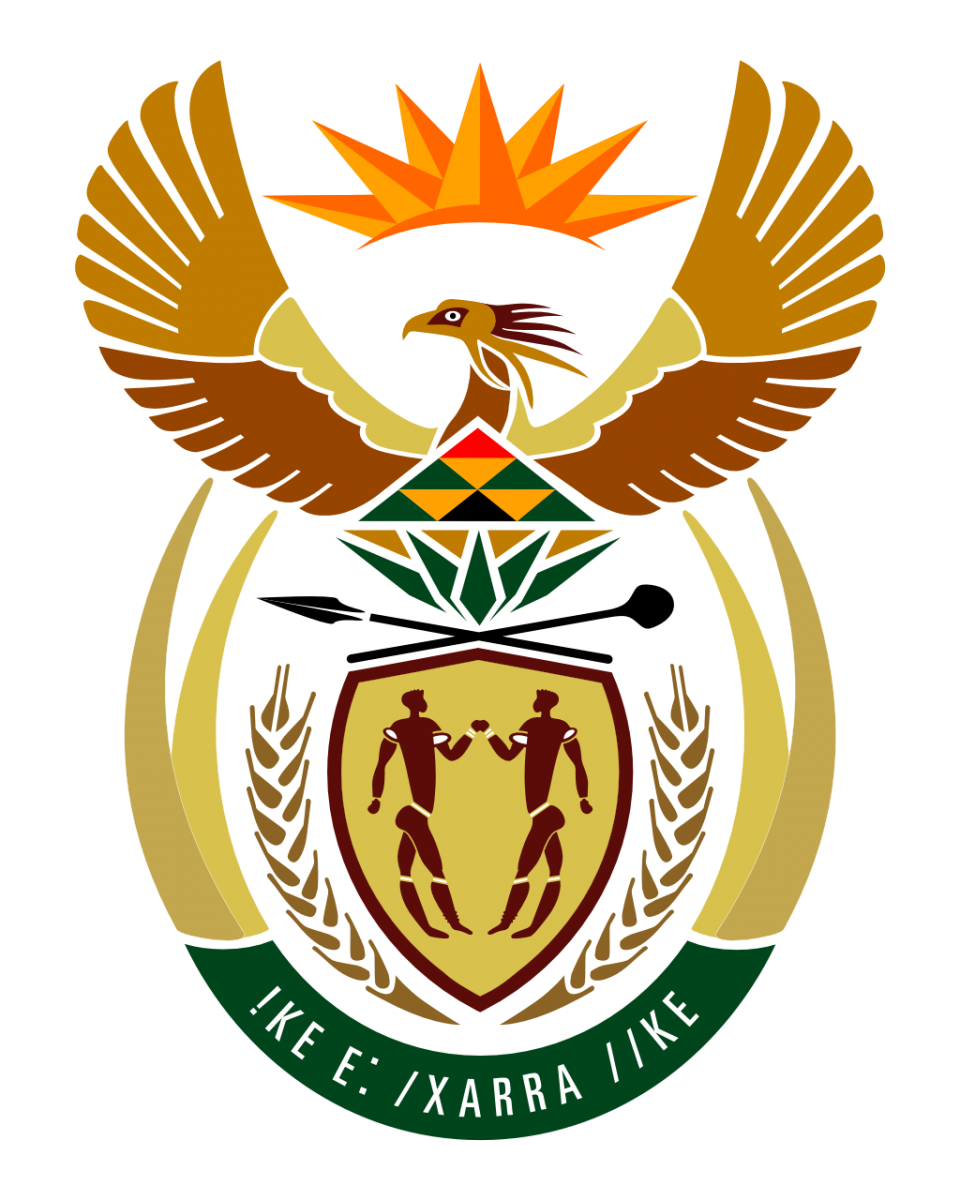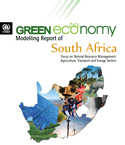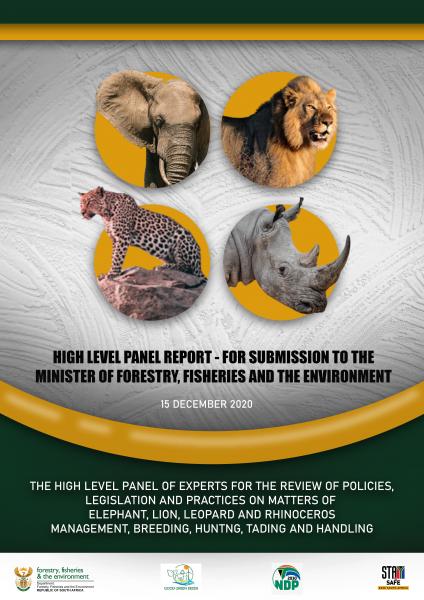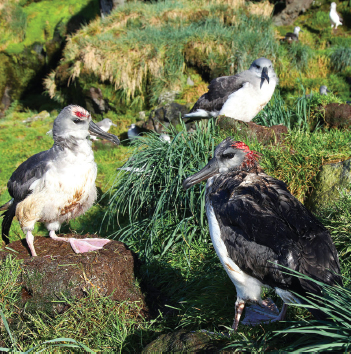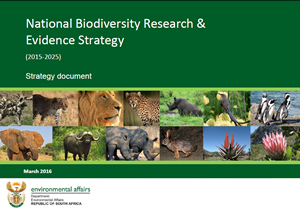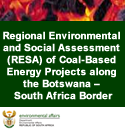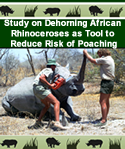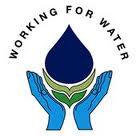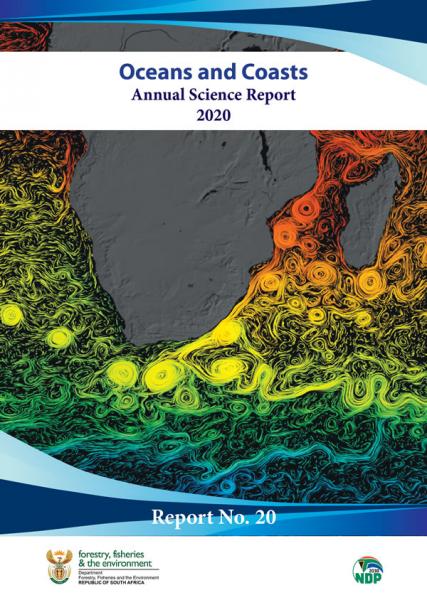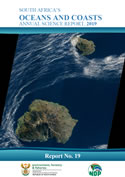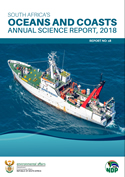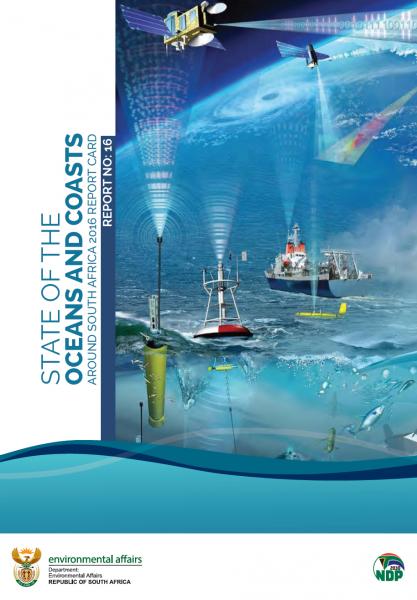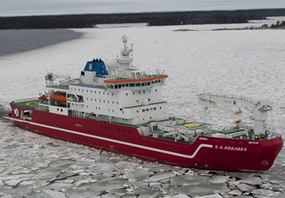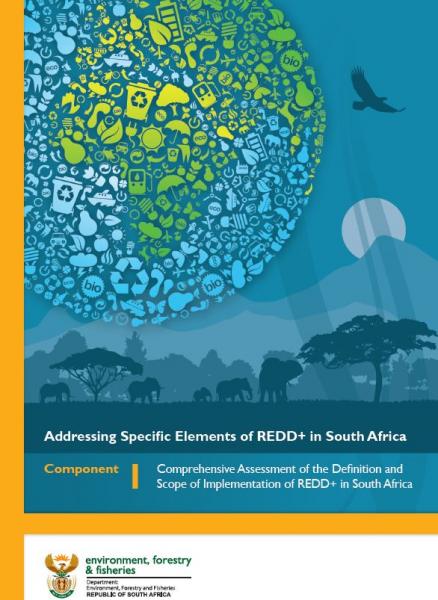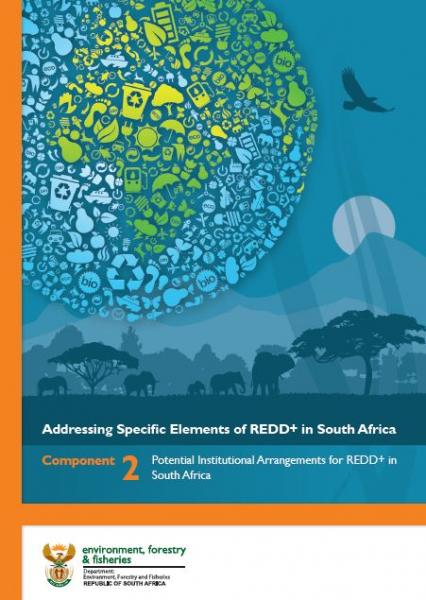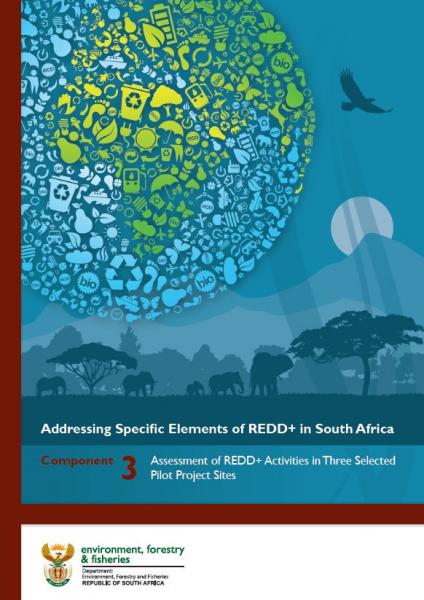Research documents
South Africa's 2021 Grid Emission Factors Report
South Africa recognises that climate change poses considerable risks and constraints to sustainable economic growth. To address this, South Africa’s Just Energy Transition Plan aims to lower greenhouse gas (GHG) emissions significantly and harness investments in new energy technologies. This commitment is further confirmed in the Just Energy Transition Investment Plan (JET IP) for 2023 – 2027 that declares its aim to accelerate the decarbonisation of the electricity system. The fulfilment of these objectives will result in a less emissions intensified electricity grid overtime.
» download report [PDF - 4MB]
A Blue Carbon Sinks Assessment for South Africa
Blue carbon ecosystems are a key component of the global carbon cycle. Enhancing carbon storage and sequestration from these ecosystems has been increasingly recognised as a key component for climate change mitigation over the past decade. As climate change continues to escalate, it is unlikely that emissions reductions alone will be sufficient to curb the current trends in global warming – and therefore enhancing CO8 removals will be necessary. The oceans and associated marine ecosystems have an important role in national and global strategies for climate change mitigation in this regard. As a signatory to the Paris Agreement, South Africa has made commitments towards reducing emissions, while still aiming
» download report [PDF - 849kb]
Report Of The International Review Panel Regarding Fishing Closures Adjacent To South Africa’s African Penguin Breeding Colonies And Declines In The Penguin Population
Report Of The International Review Panel Regarding Fishing Closures Adjacent To South Africa’s African Penguin Breeding Colonies And Declines In The Penguin Population
» download report [PDF - 1,68MB]
Report Of The International Review Panel Regarding Fishing Closures Adjacent To South Africa’s African Penguin Breeding Colonies And Declines In The Penguin Population
Report Of The International Review Panel Regarding Fishing Closures Adjacent To South Africa’s African Penguin Breeding Colonies And Declines In The Penguin Population
» download report [PDF - 849kb]
Scientific Output Of The Branch: Fisheries Management Of The Department Of Forestry, Fisheries And The Environment (DFFE)
» download report [PDF - 450kb]
The South African National Climate Change Response Policy – an evidence-based policy-making case study.
Peter Lukey
South Africa’s National Climate Change Response Policy was published as a white paper in October 2011. Although the policy development process is often cited as an example of evidence-based policymaking due to the science-policy partnerships and engagements that underpinned the entire development process, the process has not been fully documented. This paper attempts to document the entire process and analyse it as an example of evidence-based policy-making.
» download report [PDF - 774 kb]
Towards sustainable development and green economy evidence strategy: workshop report
Mapula Tshangela, Nikki Funke, Ajoy Datta & Louise Shaxson
This report documents the workshop engagements and recommendations to provide inputs into the Sustainable Development and Green Economy (SD&GE) Evidence Strategy. The workshop was hosted on 30 May 2016 at the Department of Forestry, Fisheries and the Environment (DFFE) in Pretoria. The Evidence Strategies are developed as part of implementing the environment sector research, development and evidence (R,D&E) framework1 approved by the Environment Minister and Members of Executive Council (Minmec) in 2012.
» download report [PDF - 924 kb]
Working paper: Understanding the organisational context for evidence-informed policy-making
Louise Shaxson, Ajoy Datta, Mapula Tshangela and Bongani Matomela
This is the first in a series of documents that have been developed. This working paper presents ideas for discussion and debate; it describes the framework the team used to analyse how DFFE’s internal structures and processes and the external policy environment in South Africa affect how its policy-makers source and use evidence.
» download report [PDF - 3.88mb]
Evidence and policy in South Africa’s Department of Environmental Affairs
Alf Wills, Mapula Tshangela, Narnia Bohler-Muller, Ajoy Datta, Nikki Funke, Linda Godfrey, Bongani Matomela, Gary Pienaar, Nedson Pophiwa, Louise Shaxson, Wilma Strydom and Ke Yu
This is the second in a series of documents that have been developed. This report synthesises the organisational issues that influence how DFFE works with evidence to develop, implement, monitor and report on environmental policies. It is based on the findings of five studies that were conducted as part of a programme of support to DFFE between 2014 and 2016.
» download report [PDF - 2.09mb]
Guidelines and good practices for evidence-informed policy-making in a government department
Alf Wills, Mapula Tshangela, Louise Shaxson, Ajoy Datta and Bongani Matomela
This is the second in a series of documents that have been developed. This report intends to prompt discussion within South Africa’s Department of Forestry, Fisheries and the Environment and across the environment sector in South Africa. It proposes five guidelines and sets of good practice that could underpin a systematic and phased approach to improving evidence-informed policy-making within a government department.
» download report [PDF - 3.18mb]
Environment Sector Research, Development and Evidence framework
» download report [949.35 kb]
Climate Change
National GHG Inventory Report South Africa, 2017
This report documents South Africa’s submission of its national greenhouse gas inventory for the year 2017. It also reports on the GHG trends for the period 2000 to 2017. It is in accordance with the guidelines provided by the UNFCCC and follows the 2006 IPCC Guidelines (IPCC, 2006) and IPCC Good Practice Guidance (GPG) (IPCC, 2000; IPCC, 2003; IPCC, 2014). This report provides an explanation of the methods (Tier 1 and Tier 2 approaches), activity data and emission factors used to develop the inventory. In addition, it assesses the uncertainty and describes the quality assurance and quality control (QA/QC) activities. Quality assurance for this GHG inventory was undertaken by independent reviewers.
» download report [PDF - 22.4 mb]
Strategic environmental assessment for wind and solar photovoltaic energy in South Africa, 2019
Much like its predecessor, the Phase 2 Wind and Solar PV SEA aims to identify geographical areas best suited for the roll-out of wind and solar PV energy projects. In addition, one of the main aims of the SEA was to identify previously mined areas close to areas of the country with highest energy demand, where large-scale renewable projects can occur in order to contribute towards rehabilitation of mined areas and in support of job creation in the areas.
» download report [PDF - 39.34 mb]
» download appendices: specialist studies document [PDF - 23.25 mb]
Strategic environmental assessment for wind and solar photovoltaic energy in South Africa, 2015
The wind assessment domain for this first iteration of the SEA is based on the Wind Atlas for South Africa (WASA) coverage available at the time of commencing the SEA (i.e. parts of Northern Cape, Western Cape and Eastern Cape provinces). The solar PV assessment domain was informed by the location of the majority of existing solar PV project applications at the commencement of the SEA and includes the five provinces of Northern Cape, Western Cape, Eastern Cape, Free State, and North West. The SEA process is intended to be iterative, with the study being expanded to redefine and identify additional REDZs as new data and learnings become available.
» download report [PDF - 83.2 mb]
» download appendix A: specialist studies document [PDF - 88.93 mb]
» download appendix B: consultation process document [PDF - 42.72 mb]
South Africa's 3rd Climate Change report 2017
This 3rd Climate Change Report reflects on the progress made in responding to climate change, profiles ongoing efforts to this end as a basis for triggering even more ambitious climate action and chronicles key advances in the tracking of South Africa’s transition towards a climate resilient society and a low carbon economy.
» download report [PDF - 8.67 mb]
South Africa's Second National Climate Change Report, 2016
This 2016/17 report includes chapters on (i) quantifying and profiling the impact of ongoing or recently completed mitigation actions (ii) progress in the work on climate change flagship programmes (iii) lessons learn from the recent drought phenomenon (iv) progress in the development of the national adaptation strategy and desired adaptation outcomes (v) progress in establishing a credible national tracking system for key climate change actions in the country, etc.
» download report [PDF - 4.7 mb]
Unlocking barriers and opportunities for land-use based climate change mitigation activities in South Africa
The current document provides the first ever proposal for an approach to implement rehabilitation at national scale. On the one hand, the report explores opportunities that can be harnessed through the rehabilitation of the targeted systems in this study. On the other hand, it also identifies the potential barriers and how to unlock these in pursuit of ‘intact working landscapes as the foundation for the development of rural society and downstream economies’.
» download report [PDF - 19.32 mb]
National Terrestrial Carbon Sinks Assessment 2020 (NTCSA 2020)
The National Terrestrial Carbon Sinks Assessment 2020 updates the NTCSA 2014. It includes a number of improvements in core datasets and methodology, as well as providing users with an easily usable, public domain modelling interface that runs as a plugin in the QGIS open source Geographical Information System (GIS) program.
» download the technical report [PDF - 10.03 mb]
» download the summary report [PDF - 3.18 mb]
The South African Carbon Sinks Atlas 2017
The Carbon Sinks Atlas (CSA) is a web-based data and information tool aimed at providing spatial distribution of carbon stocks and fluxes across South Africa and it is the first of its kind. In this first edition, the CSA details soil and vegetation’s carbon content in the form of carbon data layers (maps) and metadata, based on the National Terrestrial Carbon Sinks Assessment (NTCSA).
» download report [PDF - 6.13 mb]
Policy brief: towards a policy on indigenous bush encroachment in South Africa
Bush encroachment entails increased abundance of indigenous woody vegetation in the grassland and savanna biomes. In South Africa, where these biomes make up 27.9% and 32.5% of the land surface area, respectively, there has been a significant increase in tree cover since national-scale aerial photography was first undertaken in the 1940s.
» download report [PDF - 4.27 mb]
Towards a policy on indigenous bush encroachment in South Africa
The aims of this study were to review the extent and causes of the problem in South Africa, broadly evaluate its impacts, determine the policy stance that South Africa should take towards bush encroachment and identify appropriate policy responses.
» download report [PDF - 14.36 mb]
Identification and mapping of soils rich in organic carbon in South Africa as a climate change mitigation option
The main purposes of this project were to develop maps, in detail and at high resolution, of soil organic carbon content as percentages and as stocks of soils across the entire South Africa; use the above maps as an input to the current electronic based National Carbon Sinks Atlas; with a focus on areas with soils high in organic carbon.
» download report [PDF - 17.68 mb]
The National Climate Change Response Monitoring and Evaluation System Framework
» download report [PDF - 1.79 mb]
South Africa's first annual Climate Change report
» download reports [Page]
Towards the development of a GHG emissions baseline for the Agriculture, Forestry and Other Land Use (AFOLU) sector in South Africa
» download report
Climate Change Mitigation Policy Mainstreaming
» download report
Sustainability of Decentralised Renewable Energy Systems report
» download report
Facilitation of large-scale uptake of alternative transport fuels in South Africa – the case for Biogas
» download report
Greenhouse Gas Improvement Programme
Download reports:
- Strategic Climate Policy Fund - Improvement of the Greenhouse Gas Emissions Inventory for the Agricultural Sector
- The Calculation of Country Specific Emission Factors for the Stationary Combustion of Fuels in the Electricity Generation Sector
- Survey on economy-wide fuel consumption with emphasis on demand-side sectors
A National Climate Change Monitoring and Evaluation system of the AFOLU Sector
» download report
Current carbon stock estimation capability for South African commercial forest plantations
» download report
Carbon Offset Standards and Methodologies Project Steering Committee
The National Terrestrial Carbon Sinks Assessment (NTCSA) for South Africa was primarily undertaken to improve our understanding of the distribution of carbon stocks and fluxes, equally important to identify landbased mitigation opportunities that can avoid or decrease emissions from the agriculture, forestry and other land use (AFOLU) sector.
» download report
Assessment of the potential to produce biochar and its application to South African soils as a mitigation measure
Biochar is gradually gaining interest globally as a climate change mitigation measure in the agriculture forestry and other land use (AFOLU) sector. It is produced in the absence of oxygen through a process called pyrolysis, mainly from biomass material. However, a host of other materials (feedstock) can be used. Several studies in different areas across the world have demonstrated that deploying biochar in soils results in benefits that include enhanced agricultural yield, a reduction in leaching of nutrients, a reduction in soil acidity, increased soil water retention and a reduction in fertilizer use and irrigation requirements.
» download report
Multiple pathways to substainable development: Initial findings from Global South
The four national approaches to sustainable development reflect the particular experiences, circumstances, and priorities of the countries that adopted them. They are representative of the broad spectrum of sustainable development approaches that exist today.
» download report
Integration of the Carbon Tax and Carbon Budgets in South Africa
This paper provides recommendations for combining the carbon budget with the carbon tax to support delivery of South Africa’s emissions reduction targets beyond 2020. While both the carbon tax and carbon budget approach have merits, economic theory would suggest that there could be risks associated with applying both instruments to the same emissions at the same time.
» download report
Freight Shift from Road to Rail Report
The Department of Forestry, Fisheries and the Environment has recently completed a Mitigation Potential Analysis (MPA) for South Africa aimed at identifying priority mitigation measures which will significantly reduce greenhouse gas emissions. One of the most favourable measures, taking both the extent of mitigation of emissions and the associated social and economic impacts in to consideration is the shift of freight from road to rail.
» download report
South African National Terrestrial Carbon Sinks Assessment
The National Terrestrial Carbon Sinks Assessment (NTCSA) is a first of its kind for South Africa and was commissioned following a directive from the National Climate Change Response Policy (NCCRP). Given this, the aim was to assess the national carbon sinks in relation to afforestation, forest restoration, wetlands, agricultural practices and urban greening.
- Section 1: Introduction of the South African National Terrestrial Carbon Sinks Assessment
- Section 2: Phase 2 - Understanding potential climate change mitigation opportunities
- Section 3: Review of existing policy
- Section 4: Assessment - Suggested future amendments to policy
Research Synopsis Report
The Long-Term Adaptation Flagship Research Programme (LTAS)
The Long-Term Adaptation Flagship Research Programme (LTAS) responds to the South African National Climate Change Response White Paper by undertaking climate change adaptation research and scenario planning for South Africa and the Southern African sub-region. The Department of Forestry, Fisheries and the Environment (DFFE) is leading the process in collaboration with technical research partner the South African National Biodiversity Institute (SANBI) as well as technical and financial assistance from the Gesellschaft für Internationale Zusammenarbeit (GIZ).
Phase 2 of the Long-Term Adaptation Flagship Research Programm include the following:
- Climate Change Adaptation Perspectives for the South African Development Community (SADC)
- Climate Information and early warning systems for supporting the Disaster Risk Reduction and Management Sector in South Africa under Future Climates
- Climate Change Adaptation Perspectives for Disaster Risk Reduction and Management in South Africa
- Climate Change Adaptation Perspectives on Urban, Rural, and Coastal Human Settlements in South Africa
- Climate Change Adaptation Perspectives on Food Security in South Africa
- Climate Change Adaptation Perspectives to future Climates in South Africa
- Long Term Adaptation Scenarios for South Africa
Adaptation Scenarios Factsheet Series
- Factsheet 1 of 7 - Perspectives for SADC
- Factsheet 2 of 7 - Climate Information and Early Warning Systems
- Factsheet 3 of 7 - Disaster risk reduction and management
- Factsheet 4 of 7 - Human Settlements
- Factsheet 5 of 7 - Food Security
- Factsheet 6 of 7 – Economics
- Factsheet 7 of 7 - Scenarios
South Africa’s Greenhouse Gas Mitigation Potential Analysis
- Mitigation report: South Africa’s Greenhouse Gas Mitigation Potential Analysis
- Technical Appendix A – Approach and Methodology
- Technical Appendix B – Macroeconomic Modelling
- Technical Appendix C – Energy Sector
- Technical Appendix D – Industry Sector
- Technical Appendix E – Transport Sector
- Technical Appendix F – Waste Sector
- Technical Appendix G – Agriculture, Forestry and Other Land Use (AFOLU) Sector
- Technical Summary
Governance of climate change in South Africa [PDF- 670.61 kb]
Synthesis of climate finance literature report to the DBSA [PDF - 1.77 mb]
Environmental research and technologies in South Africa [PDF - 892.31 kb]
Financing climate change [PDF - 723.71 kb]
Institutional funding mechanisms: case study review [PDF - 783.22 kb]
Report on the Implementation Evaluation of the Effectiveness of Environmental Governance in the Mining Sector
The purpose of this evaluation is to assess the relevance and effectiveness of the environmental governance legislation in mining and the implementation thereof in achieving its objective. The evaluation covers the period from the promulgation of the Minerals Act, 1991 (Act 50 of 1991) (the Minerals Act) up to the legislation in place as of March 2014. Given that amendments to the legislation were implemented on 8 December 2014, a post-script has been appended to the evaluation that details the context of these amendments and how they relate to the analysis and recommendations raised as part of this evaluation.
» download report
The Green Economy Modelling Report of South Africa: A focus on Natural Resource Management, Agriculture, Transport and Energy sectors
The present study was undertaken at the request of South’s Africa Department of Forestry, Fisheries and the Environment. It presents a modelling exercise that compares a scenario of investments directed to “business-as-usual” (BAU) with scenarios of investments allocated to four critical sectors for a transition to a green economy in South Africa, namely: natural resource management, agriculture, transport and energy.
» download report
The high-level panel of experts for the review of policies, legislation and practices on matters of elephant, lion, leopard and rhinoceros management, breeding, hunting, trade and handling
This report is, by and large, a consensus report of the High-Level Panel of Experts for the Review of Policies, Legislation and Practices on Matters of Elephant, Lion, Leopard and Rhinoceros Management, Breeding, Hunting, Trade and Handling (‘the HLP’) – as reflected in the set of goals and recommendations framed within Chapter Nine. There are however some areas in relation to the HLP’s identified goals and recommendations where it was not possible to reach full consensus. In such cases, the report reflects these as majority and minority views as provided for in the HLP’s Charter.
» download report
South Africa works towards eradicating introduced house mice from sub-Antarctic Marion Island: the largest island yet attempted for mice
House mice (Mus musculus) were introduced to South Africa’s sub-Antarctic Marion Island, the larger of the two Prince Edward Islands, by sealers in the early 19th century. Over the last two centuries they have greatly reduced the abundance of native invertebrates. Domestic cats (Felis catus) taken to the island in 1948 to control mice at the South African weather station soon turned feral, killing large numbers of breeding seabirds.
» download report
National Biodiversity Research Development and Evidence Startegy 2015 - 2025
This document sets out the strategy for biodiversity research and evidence between 2015 and 2025. It broadly describes the needs for evidence to support achievement of the National Biodiversity Strategy and Action Plan (NBSAP) and other policy priorities. This strategy document is accompanied by an annual implementation plan, which details what evidence is needed in the short to medium term to inform policy decision-making, and the medium to long-term evidence that provides the foundational knowledge for the sector.
» Strategy document 2015 - 2025 [PDF]
» Annual implementation plan 2016 - 2017 [PDF]
Overview of current approaches and practices of South African businesses to the mainstreaming of biodiversity - A Preliminary Baseline Assessment
The National Biodiversity and Business Network (NBBN) was created to support the mainstreaming of biodiversity into business in South Africa. In order to better understand the current status quo in South Africa, the Department of Forestry, Fisheries and the Environment (DFFE) in collaboration with the NBBN decided to conduct this preliminary baseline assessment with the aim of assessing current approaches and practices of South African businesses to mainstream biodiversity.
» download report
Regional Environmental and Social Assessment (RESA) of Coal Based Energy Projects along Botswana-South Africa Border: Phase 1 and TOR
The Government of the Republic of Botswana and the Government of the Republic of South Africa have signed a Memorandum of Understanding (MoU) to carry out a Regional Environmental and Social Assessment (RESA), with support from the World Bank, to examine the cumulative environmental and socio-economic impacts of all the planned and existing energy sector investments on both sides of the border between Botswana and South Africa. In order to define the scope of work for a detailed RESA Study, an initial assessment was made which is included in the Phase-1 Report of the RESA hereby attached.
» download report [PDF - 766kb]
A study on the dehorning of the African rhinoceroses as a tool to reduce the risk of poaching
This report is the product of the study on rhino dehorning and was conducted on behalf of DFFE by the Endangered Wildlife Trust. The aim of the report is to provide clarity on the impacts and efficacy of dehorning and to identify the circumstances under which the intervention is most likely to be effective at reducing poaching.
» download report [PDF - 2.95 mb]
Working for Water priority needs in the field of research include: (a) the need to convince all the relevant people within WfW and its parent departments of the essential nature of the programme’s research effort; (b) the urgent need to secure a sound institutional base for, and to massively increase the human capacity for the research effort that will be necessary if WfW is to have any hope of achieving its long-term objectives among others.
» read more
The oceans and coasts annual science report: report no. 20 of 2020
The oceans and coasts annual science report, 2020, previously known as the state of the oceans and coasts around South Africa report card covers environmental monitoring results and research highlights achieved during the 2020 calendar year. Also presented are various tools and technologies that have been developed or utilised in support of the science programmes. A summary of the findings, with some perspectives, is provided for decision and policy makers, as well as a list of research outputs for 2020.
» download report [PDF - 16.16 mb]
The state of the oceans and coasts around South Africa - annual science report: report no. 19 of 2019
South Africa’s oceans and coasts annual science report, 2019, presents results of research and monitoring conducted by the department on a number of physical, biological and chemical aspects of oceans and coasts (including estuaries) around South Africa, in the southern ocean, or other parts of the African ocean regions. As in the annual science report for 2018, this report has a section dedicated to monitoring programmes with summary updates for the last calendar year, and a section for research highlights, presenting summaries of research that has been published or presented at symposia during 2019.
» download report [PDF - 22.3 mb]
The state of the oceans and coasts around South Africa - annual science report: report no. 18 of 2018
The body of this report is made up of 22 contributions. Each separate contribution is termed a “report card” and the prefix “R” is used when referring to them by number below. Ten of the report cards are listed under the heading “monitoring programmes” and 11 under “research highlights”. Under each of these main headings there is a distinct subsection, presenting findings of the Southern Benguela Integrated Ecosystem Programme and the Second International Indian Ocean Expedition, respectively (four report cards each). The last report card is a single contribution against the heading “Research support”.
» download report [PDF - 2.58 mb]
The state of the oceans and coasts around South Africa - annual science report: report no. 17 of 2017
This is the 17th issue covering some of the environmental monitoring activities and research results obtained during the 2017/2018 financial year. It describes scientific observations in the marine environment, from the inshore to the offshore and from the ocean surface to the ocean floor within South Africa’s exclusive economic zone.
» download report [PDF - 3.69 mb]
The state of the oceans and coasts around South Africa - annual science report: report no. 16 of 2016
In this report, the department provides updated information on the status of some parameters for South Africa’s oceans and coasts, ranging from chemical and physical properties to biological assessments. These have been selected as potentially useful indicators of the change, health and management of South Africa’s marine ecosystems. The format of this report is aimed at providing a brief overview of the research and monitoring undertaken within the department.
» download report [PDF - 2.55 mb]
The state of the oceans and coasts around South Africa - annual science report: report no. 15 of 2015
In this report card, DFFE provides brief synopses of some results of monitoring a suite of variables that range from physical and chemical ocean properties to plankton and other biological attributes, which have been chosen as potentially useful indicators of change, health and management of South Africa’s marine and coastal systems.
» download report [PDF - 2.34 mb]
The state of the oceans and coasts around South Africa - annual science report: report no. 14 of 2014
In this report, aspects of this monitoring and research are briefly elaborated upon. The report considers some features of the physical and chemical oceanography of South Africa’s marine environment and then the plankton of its oceans, which form the basis of the marine food webs.
» download report [PDF - 3.18 mb]
South African Water Quality Guidelines for Coastal Marine Waters: Volume 2 - guidelines for recreational use
This document contains the revised guidelines for recreational waters of South Africa's coastal marine environment, which addresses some of the shortcomings of the previous version (DWAF, 1995). The aim is to provide managers and governing authorities with the background and guidance to define target ranges for recreational waters, as well as to provide guidance on the implementation thereof....
» download report
» download a summary report
Antarctica and Southern Ocean Islands
South Africa’s involvement in Antarctica and the Southern Ocean Islands dates back to the earliest voyages of discovery, due to the then Cape of Good Hope’s position as a stop-over for explorers, whalers and sealers (people hunting whales and seals). Post-graduate thesis have been produced from research on Marion Island, and South Africa has been operating a weather station on Gough Island since 1956. The country has also launched the new research and supply vessel, SA Agulhas II and was dedicated to the late Singer Miriam Makeba.
» read more
Feasibility studies
| 2020 | |||||||
| Abalone {PDF - 2.95 mb] | |||||||
|
|||||||
| African sharptooth catfish [PDF - 4.16 mb] | |||||||
|
|||||||
| Marine finfish (dusky kob and Atlantic salmon) aquaculture [PDF - 4.99 mb] |
Financial models
Atlantic salmon 2000t RAS Hatchery and RAS grow-out [Xlsx - 1.22 mb]
Atlantic salmon 2000t RAS Hatchery and RAS grow-out [Xlsx - 1.33 mb]
Dusky kob 500t RAS hatchery and cage [Xlsx - 2.64 mb]
Dusky kob 500t RAS hatchery and ponds [Xlsx - 918.05 kb]
Dusky kob 500t full RAS system [Xlsx - 958.99 kb]
| Marron Crayfish [PDF - 1.80 mb] | |||||||
|
|||||||
| Nile and Mozambique tilapia [PDF - 4.53 mb] | |||||||
|
|||||||
| Freshwater and marine ornamental fish [PDF - 3.15 mb] | |||||||
|
|||||||
| Oysters and mussels aquaculture [PDF - 4.47 mb] |
Financial models
Mussels rafts 80tpa [Xlsx -2.58 mb]
Mussels rafts 500tpa [Xlsx - 2.63 mb]
Pacific oyster 70tpa longlines [Xlsx - 2.07 mb]
Pacific oyster 200tpa longlines [Xlsx - 2.1 mb]
Rainbow trout
-
Economic analysis model
- List of publications: Scientific output to provide scientific advice for resource management:
- List of publications: Seaweed - current and potential commercial species, 2013. [PDF - 90.68 kb]
- List of publications: Seaweed - diversity, 2013. [PDF - 88.48 kb]
- List of publications: Seaweed – beneficiation, 2013. [PDF - 79.97 kb]
Research projects
- Animal health and dseases, 2013. [PDF - 20.22 kb]
- Climate change and marine resources. [PDF - 26.4 kb]
- Environmental interactions [PDF - 25.55 kb]
- Research ship Africana. [PDF - 417.82 kb]
- Research ship Ellen Khuzwayo. [PDF - 306.45 kb]
- Resources research surveys and assessment. [PDF - 23.7 kb]
- South coast rock lobster. [PDF - 158.42 kb]
- Grid references: Seaweed concession areas. [PDF - 48.16 kb]
- Description of commercial seaweed sector. [PDF - 1017.36 kb]
- Species diversification and competitiveness. [PDF - 27.43 kb]
- Tuna longline and tuna pole. [PDF - 1.65 mb]
- West coast rock lobster. [PDF - 629.92 kb]
Addressing Specific Elements of REDD+ in South Africa - Component 1
South Africa has taken a progressive approach in its response to climate change. Following early ratification of the Kyoto Protocol, the country published a National Climate Change Response Strategy (NCCRP) (DFFE 2011) and has gradually developed a substantial foundation on which to base future policy and measures. A particular opportunity that has been identified is the implementation of a national programme aimed at reducing emissions from deforestation and forest degradation (REDD+).
» download report [PDF - 4.31 mb]
Addressing Specific Elements of REDD+ in South Africa - Component 2
Climate change has been identified as a clear threat to South Africa, and the country has decided to address it in a proactive and progressive manner. Following early publication of a National Climate Change Response Policy (NCCRP) (DFFE 2011), a substantial foundation on which to base future policy and measures has been developed.
A particular opportunity that has been identified is the implementation of a national programme aimed at reducing emissions from deforestation and forest degradation (REDD+).
» download report [PDF - 4.53 mb]
Addressing Specific Elements of REDD+ in South Africa - Component 3
South Africa has taken a progressive approach in its response to climate change. Following early ratification of the Kyoto Protocol, the Country published a National Climate Change Response White Paper in 2011 (DFFE 2011) and has gradually developed a substantial foundation on which to base future policy and measures. A particular opportunity that has been identified is the implementation of a national programme aimed at reducing emissions from deforestation and forest degradation (REDD+).
» download report [PDF - 5.65 mb]
Woodlands and indigenous forest management
- A collation and overview of research information on acacia erioloba (camelthorn) and identification of relevant research gaps to inform protection of the species, 31 August 2003. [PDF 260 kb]
- Assessment of the livelihoods importance of forestry, forests and forest products in South Africa, September 2004. [PDF 313.8 kb]
- Baseline study on woodlands in South Africa, 2002, February 2002. [PDF - 353.15 kb]
- A collation and overview of research Information on boscia albitrunca (shepherd’s tree) and identification of relevant research gaps to inform protection of the species, 18 August 2003. [PDF - 93.3 kb]
- Do we understand the causes of bush encroachment in African savannahs' ? 24 January 2005. [PDF - 243.69 kb]
- Classification system for South African indigenous forests, April 2003. [PDF - 15.04 mb]
- A collation and overview of research information on combretum imberbe warwa (combretaceae) and identification of relevant research gaps to inform protection of the species, 06 August 2003. [PDF - 119 kb]
- Outline of woodlands types. [PDF - 20.2 kb]
- Declared list of champion trees, November 2012. [PDF - 294 KB]
Small scale forestry
- Briefing 1: Trade in large or small scale saw milling in South Africa, January 2005. [PDF - 383 kb]
- Briefing 2: Manufactured timber products, January 2005. [PDF - 354 kb]
- Briefing 4: The timber pole market, January 2005. [PDF - 370 kb]
- Briefing 5: Trade in medicinal plants, January 2005. [PDF - 399 kb]
- Briefing 6: Trade in Forest ferns and foliage. Forestry sub-sector studies, January 2005. [PDF - 477 kb]
- Briefing 7: Processing and trade in indigenous fruits, January 2005. [PDF - 488 kb]
- Briefing 8: Trade in boletus mushrooms, January 2005. [PDF - 367 kb]
- Briefing 9: The honey trade. Forestry sub-sector studies, January 2005. [PDF - 357 kb]
- Forestry transportation requirements plan, July 2017. [PDF - 21.44 mb]
- Eastern Cape forestry sector profile, June 2008. [PDF 710.46 kb]
- Key issues paper on forestry enterprise development, January 2005. [PDF - 274.03 kb]
- Case studies in South Africa: participatory forest management, September 2005. [PDF - 10.24 mb]
- South African forest industry market analysis, 29 June 2005. PDF - 631.72 kb]
- The development of strategic environmental assessment (SEA) report for the zone of afforestation potential in the Eastern Cape: scoping report, 30 June 2005. [PDF - 3.45 mb]
- Draft: The development of strategic environmental assessment report of afforestation in water management area 12, covering northern and eastern parts of the Eastern Cape Province, 29 August 2005. [PDF - 11.28 mb]
Forestry regulation and oversight
- Study of supply and demand of industrial round wood in South Africa; a sub-sectroal analysis
- Statistics report: Commercial timber resources and primary round wood processing in South Africa.
- 2000/2001 [PDF - 782.67 kb]
- 2001/2002 [PDF - 851.74 kb]
- 2002/2003 [PDF - 1.45 mb]
- 2003/2004 [PDF - 367.09 kb]
- 2004/2005 [PDF - 582.83 kb]
- 2005/2006 [PDF - 786.9 kb]
- 2007/2008 [PDF - 382 kb]
- 2008/2009 [PDF - 327 kb]
- 2011/2012 [PDF - 516.27 kb]
- 2012/2013 [PDF - 467.13 kb]
- 2013/2014 [PDF - 464.01 kb]
- 2014/2015 [PDF - 463.72 kb]
- 2015/2016 [PDF - 1.4 mb]
- 2016/2017 [PDF - 1.43 mb]
- 2017/2018 [PDF - 1.43 mb]
- National veldfire risk assessment: analysis of exposure of social, economic and environmental assets to veldfire hazards in South Africa, March 2010. [PDF - 5.59 mb]
- Appendices [PDF - 576.22 kb]
- Draft key issue paper on forestry and poverty in South Africa, June 2005. [PDF - 510.55 kb]
- Draft discussion document. Protected area system planning for indigenous forests of South Africa: policy, core issues, objectives and targets, September 2005. [PDF - 58.76 kb]
- Assessment of the Gauteng firewood market and the origin of protected tree firewood products sold, 21 September 2007. [PDF - 989.11 kb]
- Part I: The contribution, costs and development opportunities of the forestry, timber, pulp and paper industries in South Africa, 29 June 2005. [PDF - 1.02 mb]
- Trends in the incidence of poverty in district municipalities with significant areas of forests and plantations, 30 September 2005. [PDF - 200.42 kb]
- A review of the veld fires in the Western Cape during 15 to 25 January 2000: toward improved veldfire management in South Africa. Report to the minister, 30 September 2005. [PDF - 857.49]
Commercial forestry
- Supply and demand study of softwood sawlog and sawn timber in South Africa, 05 April 2005. [PDF - 2.63 mb]
- Key issue paper for a policy on transfers of state owned industrial plantations, 04 February 2005. [PDF - 1.33 kb]


